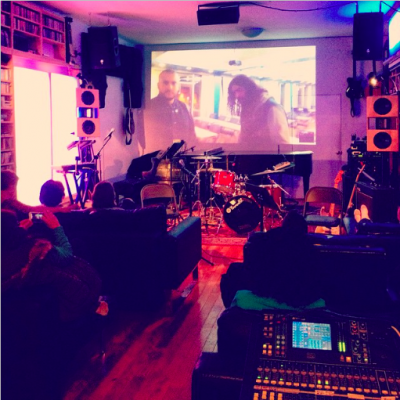 On March 3rd, NCAC and the international organization Freemuse–which defends freedom of expression for musicians and composers–celebrated Music Freedom Day at Spectrum, an avant-garde music and multimedia space. Music Freedom Day is an annual event that celebrates music and supports censored, persecuted and imprisoned musicians. Since 2007, it has taken place in 36 countries around the world; this year it was celebrated in 10 countries including Pakistan and Zimbabwe.
On March 3rd, NCAC and the international organization Freemuse–which defends freedom of expression for musicians and composers–celebrated Music Freedom Day at Spectrum, an avant-garde music and multimedia space. Music Freedom Day is an annual event that celebrates music and supports censored, persecuted and imprisoned musicians. Since 2007, it has taken place in 36 countries around the world; this year it was celebrated in 10 countries including Pakistan and Zimbabwe.
The evening at Spectrum started out with music from censored artists, accompanied with information about the artists and their personal history facing censorship. One was Mahsa Vahdat, anIranian artist who is not allowed to perform for mixed audiences in her own country without a male companion. After Iran’s Islamic Revolution in 1979, female singers had to make written promises not to sing in public. Mahsa refuses to perform for women only, and therefore her concerts are held outside Iran. Another was Ferhat Tunç, a Kurdish singer, songwriter and political activist who immigrated to Germany in 1979 as he was not allowed to perform in his native language. Ferhat has gone through endless court cases, received death threats, faced police brutality and has been sentenced to jail because of his music.
The first live act of the evening was performed on a Skype call to Harstad in Norway, where 250 people had gathered to celebrate Music Freedom Day. We talked to Freemuse executive director Ole Reitov, who spoke on camera to Ramy Essam and Khaled Harara about music censorship. Ramy is known as “the voice of the Egyptian revolution,” while Khaled is a Palestinian rapper currently living in Gothenborg, Sweden as a ‘safe city’ residence. A live joint performance followed. This was the first collaboration between the two. Ramy and Khaled hardly had time to practice their performance, but their song was extremely powerful and the vibe was great.
Afterwards, Redacted–a trio composed of vocalist Jill Burton, pianist and composer Gordon Beeferman and guitarist Chris Cochrane–performed in New York. The act was a rare experience; it included singing and all kinds of variations of human noises–such as grunting and breathing–as the musicians played alongside Burton’s (redacted) expressions.
Next up was a screening of an excerpt from the documentary “They Will Have To Kill Us First,” a film about the exiled Mali festival “Festival au Désert” and censored musicians in Mali.
The second live act of the evening was The Casualty Process, an Iranian electronic rock band in exile, which consists of Natch Nadjafi on guitar, keyboard, MIDI, controller, and vocals, and Shayan Amini on guitar, bass, and vocals. They were joined by Austin Dacey on guitar and vocals. The live performance was energetic and had an eclectic sound and catchy hooks.
The last performance of the evening was Ravenact, a NYC/Berlin duo, which is a collaboration of violinist Sara Walraf and pianist Liz Kosack. Based on Sara’s poetry, Ravenact compose the various dimensions of dialogue. Their entrancing performance featured a mix of voices, projected poetry, masks, instruments, light and shadows.

